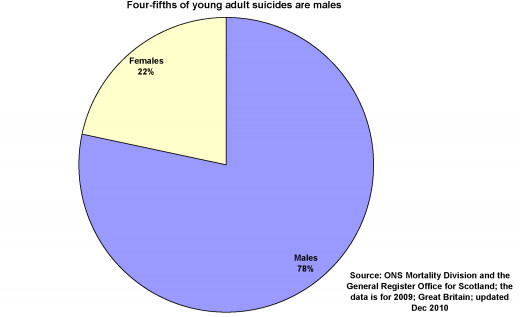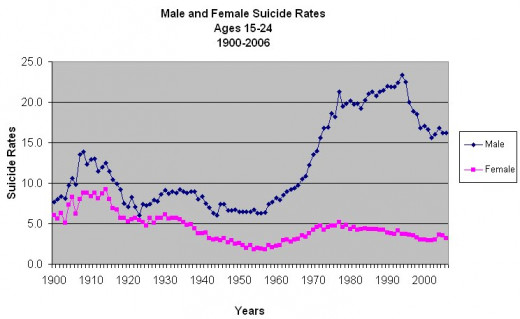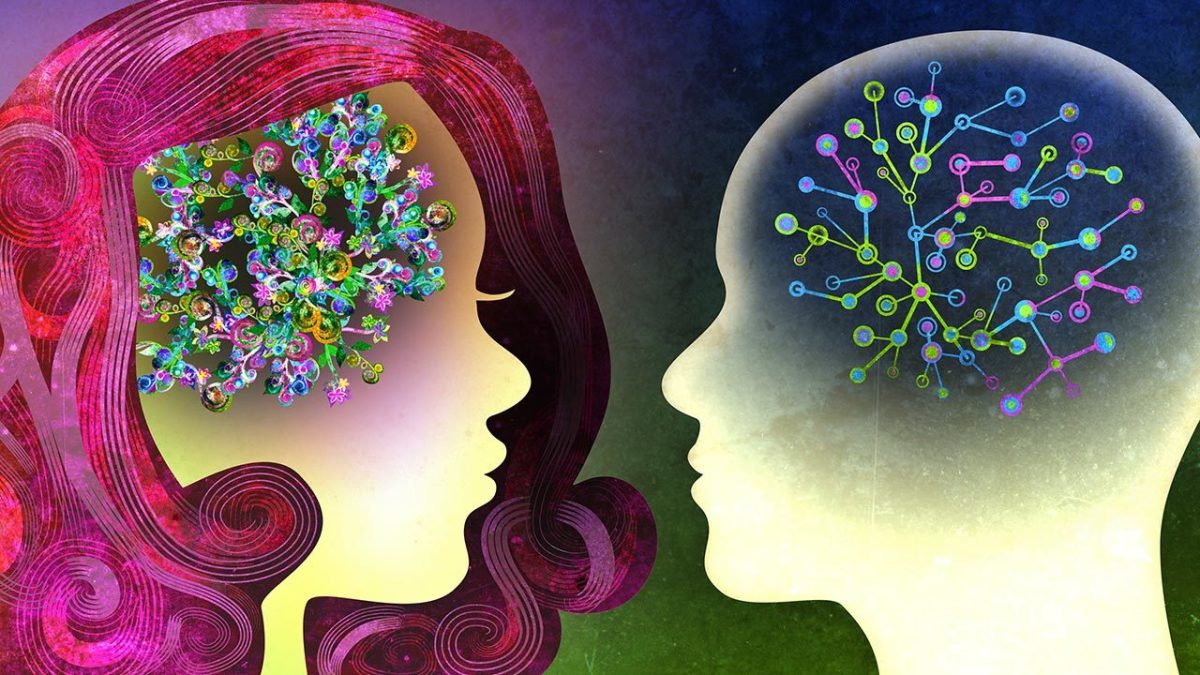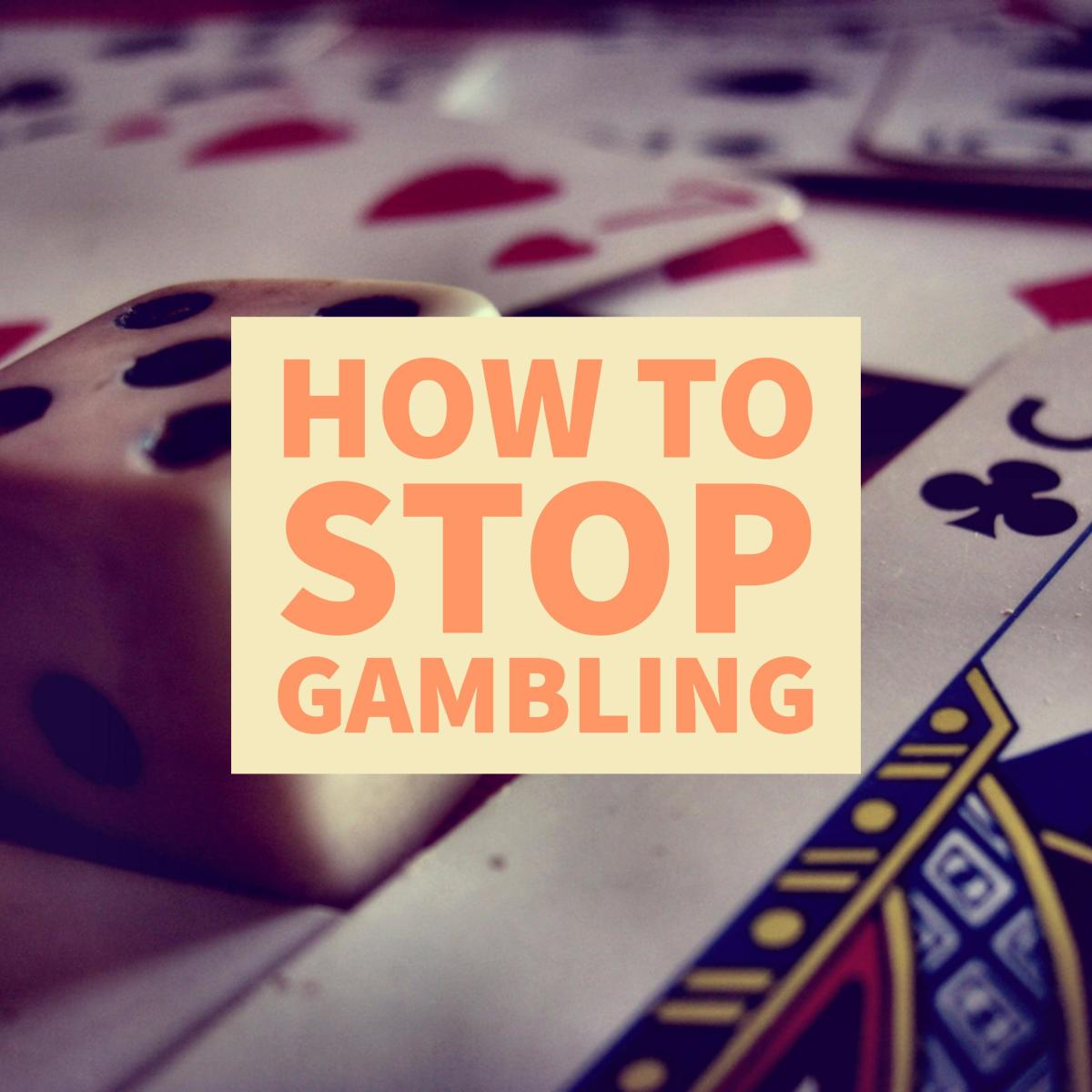Male Suicide And Depression
Relative Rates Of Male (Blue) vs Female Suicide (Pale Yellow) Between The Ages Of 15-24 In The UK. A Trend Also Seen In Australia, The US And Across The West

I wanted to dedicate this article to all of the families and friends that have lost the men they love and care about in their lives through suicide and depression. This is a terrible scourge on society and a worrying trend (As the adjacent figure clearly demonstrates-From 2009/10 data, 78% of young adult suicides in the UK are male) which is seen across all Western countries. Indeed as shown in the figure below, male suicide particularly among young men, has risen markedly relative to women since the late sixties and is at epidemic proportions. Despite this, our politicians, media and governments largely ignore men's issues and the problems men face. Men's suffering in society is mostly ignored and so their problems fester. The "invisible man" is a reality.
The Epidemic Of Male Youth Suicide In The US

I personally have had a number of men I know in my life go through some really tough times. One did his back whilst working on the job and is now living with chronic pain. He has struggled to find work since and is still looking. A couple of months back he disappeared from us and we feared the worst. Fortunately he was found but he was not in good mental shape. Depression is something that can creep up on people, particularly men. Another friend of the family also went through a rough patch a couple of years back and unfortunately hung himself. This is an individual that if you met him, would have been one of the most joyful and carefree individuals you would ever meet. It was sudden, unexpected and came with little or no warning. Men hide how they feel and are anxious about seeking help. Not because they are built that way, but because they are pressured to be that way. I could also bring up my own life, the struggles I faced and the impact that had on my mental health in my early-mid 20s. All I can say is thank goodness I have a family that loves me. My own brother has had dark periods as well.
For men the dangerous period of life is when you are in your 20s. Both of the men I mentioned above were incidentally in their 20s. These are the years when you feel like the weight of the world is on your shoulders and the challenges in life seem insurmountable. The expectations we set for ourselves when we are young, come up against the realities of life. Men are raised to be stoic, to not ask for help and to see anything otherwise as a sign of weakness. Hence the anxiety in asking for help and the hiding of negative thoughts or feelings. We are encouraged and pressured to put on a show and pretend everything is ok, even when it is clearly anything but. Again men are not built this way, we are raised this way from birth and pressured to conform to these social norms until death, no matter what the cost. Society and our culture dehumanises men.
The man in his 20s is meant to emulate the ideal of the invincible, all powerful, conquering and successful alpha male. He is meant to be on track to get the money, the beautiful girl, a high powered career and start a family. That is the pressure our culture places on men. Yet this period in a man’s life is precisely when men are at their most vulnerable and face their greatest challenges. This is why the suicide rate among young men is so high. No doubt there are far greater numbers of men suffering depression than reported (which is already sky high). Why would men report these things when we are raised not to? You have to drag a man to just see a doctor! It is only when the problems men face actually lead to death, that they become shockingly visible.
Men And Mental Health
We don’t raise men to manage their emotions or to seek the support of others like we do women. We raise them to be stoic and to repress and ignore their own feelings. If men do express emotion or distress, then we often ridicule them for it and make their problems the butt of jokes. We tell men that their feelings don’t matter and encourage them to devalue their own humanity. It is in this way that men are discouraged from seeking help. Then we ironically blame them for not seeking support when they finally break down, whilst failing to acknowledge societies culpability in shaming men who ask for help and for not being "real" men. As a society, we treat men like we treat machinery. I would argue that because of how they are raised, men are psychologically more vulnerable than women. Even when men are actually encouraged to express their emotions, it is expected that they do so in a feminine way (including in a clinical mental health setting as the adjacent video above discusses) and yet men and women feel and express emotions and deal with trauma differently. No understanding or allowance is given for men to express and manage their emotions or problems in a way that is natural to them individually and with respect to their masculinity.
We live in a society that neglects men and ignores the male perspective and life experience. If you are a man, then society expects you to always solve your own problems without help, regardless as to how much trouble you might be in. This is true whether we are talking about changing a tire on the side of the road or recovering from a debilitating work related injury. Look at how the US treats its own injured war veterans and whom are mostly men! If you are a woman then society sees you as the vulnerable gender and often is willing to bend over backwards for you. If you are in trouble, then society rushes to your aid.
How Men And Boys Are Isolated In Society
We have almost every form of women's support group you could think of or come up with a name for. For every 5-10 groups or organisations that support or help women, there are 1-2 groups or organisations that support or help men. The same disparity in favour of women is seen in funding. Are women really that more vulnerable than men in today's modern society? Is it not exaggerated just a tad by certain interest groups? Playing on our predisposition to view women as the more vulnerable gender, is the key manipulative tool behind feminism and has allowed them to convince society to regard gender issues as solely affecting women. The gynocentrism in addressing gender issues, has been around for decades and continues to be that way to this day. The problem is that vulnerability is not just a physical characteristic and as I said, men are arguably more psychologically vulnerable than women. Today it is actually psychological rather than physical vulnerability, that is more relevant in modern western society. We don't live in prehistoric times anymore!
In hand with societies expectations and pressures on men to adopt a life of unrelenting stoicism, society also neglects men’s issues. Such an issue is the boy crisis in education (see my HubProfile for my 8 Hubs on the subject). Boys start struggling in school early and by the time they reach senior high school if they even get there, they are far behind. As they develop into men, their lack of education precludes them from work that is increasingly becoming information based and requiring a tertiary qualification (college or university in the US). Consequently, many of these young men become unemployed and directionless. Lacking a tangible goal is a recipe for disaster. Without a future to look forward to or work toward, they are more likely to become depressed. Eventually this may lead to suicide.
We are letting boys down and the men they eventually develop into. We are neglecting boys and our future men. We are cruelly raising them to not seek help and not feel that it is ok to express emotion. I would call that psychological abuse and neglect. It is causing mental illness and it is driving the depression and suicide we see among men. Then we have our media and society telling men they are defective and inferior, or no good. Boys see and hear these messages too. We even have Hubs on reasons why women hate men, why men are inferior and all the problems or things men do wrong. Most of these are of course generalised to all men. What about the things we do right? Are men not human beings? Society seems to revel in kicking men while they are down. How sick is our society, where attacking the dignity of half the population is entertaining, funny or worth celebrating and gloating about (see my article on Hanna Rosin and "The End Of Men")? How do people expect men to react to that? Depression, suicidal thoughts....
Who is to blame? We all are. Men, women, politicians and society as a whole. We all develop and reinforce the culture and social norms that give rise to the large prevalence of suicide and depression among men. We must stop viewing men as invincible creatures that have no vulnerability whatsoever and stop treating them like machinery. Men are just as psychologically vulnerable as women, if not more so. Men need just as much psychological support as women do and yet we are not getting it. If we do not change our course as a society, this sad tale is going to continue to play out in homes across the West and the world.
We don’t live in caves anymore, this is the 21st century. Men are as vulnerable as women are in this modern environment. Given the consistent ignorance and apathy to men’s rights issues and the declining psychological health of men, we have our work cut for us as a society. We dug this hole and now we need to dig our way out of it. We need to stop raising boys and pressuring men to be unemotional ATM workhorses and to place their physical and psychological health second. Perhaps if we start turning the tide as a society, maybe, just maybe, we will stop these needless and sad tragedies from happening.
Handle Men With Care
How many more families, households, wives, girlfriends, employers, teachers and friends have to lose a man they care about in their lives, before we take this problem seriously at a national and international level? Whilst this article had a particular focus on suicide amoung young men, the suicide rate for men in general at all ages is several multiples that of women. In some older age brackets, the suicide rate is actually higher for men than suicide amoung male youth. This is particularly so with respect to divorced men. Suicide amoung men is a systemic problem within the male population, it is not just a problem isolated to a few demographics.
I will place a few contact sites for men in Australia (don't know about other places sorry) that are a bit down and need some professional but confidential help. If you are a wife or girlfriend of a man that is not himself lately, don’t ignore it. Men have been taught and pressured to hide and ignore psychological vulnerability from birth (all forms of vulnerability) and have become experts at it. The signs might be very subtle. Fortunately women are likely to notice those types of things. Disconnecting from daily activities, engagements and particularly hobbies, is one of the first signs something is not right. Spending all or most of his time in the "man cave" is another.
Some useful Australian sites are:
http://www.beyondblue-men.org.au/-For depression and anxiety.
http://www.mensline.org.au/-For relationship and family issues.
I am not sure about the US, the UK and Canada etc. I would hope that they have at least something comparable available.
Here are some sites I am aware of for North America:
http://www.shrink4men.com/-For help in abusive relationships.
http://menaregood.com/wordpress/-For general information on men's issues.
http://www.webhealing.com/-For help in dealing with grief.
My message to men is simple.- Start caring about each other and about your own well-being. Defend your rights and interests. Demand that you be listened to and that you rightfully receive support and attention. I am directing this message at men individually, collectively and most importantly at a societal level.
For the women that do support men.- A sincere and big thank you!
For the women that hate men.- Would you treat yourself that way?
If we men keep saying nothing, then nothing will happen. If we keep putting up with things and not demanding justice, fairness and change, then nothing will change.








